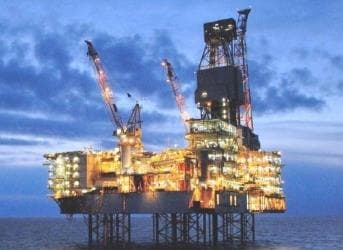As U.S. Secretary of State John Kerry and European Union leaders threaten that harsh economic sanctions could be imposed on Russia for its intervention in Ukraine, Russian state-controlled natural gas giant Gazprom has threatened to disrupt gas supplies to Europe, turning the Ukraine crisis into a possible trade war.
“Simmering political tensions in Ukraine, that are aggravated by inadequate economic conditions, may cause disruptions of gas supplies to Europe,” Gazprom noted, before adding that it would do its utmost to reduce export risks. “We will further invest into other export-oriented projects such as South Stream and will enhance our LNG (liquefied natural gas) production and export capacity. We will also increase our access to underground gas storage facilities in Europe.”
The reality is that for Gazprom, Ukraine is a deadbeat customer. On 1 March Gazprom spokesman Sergei Kuprianov said that Gazprom could cancel its gas supply discount for Ukraine as its overdue debt for gas reached $2 billion, which is not only for 2013 supplies, but current deliveries as well. In late January Ukraine had asked Russia for deferral of payments for gas supplied in 2013 and early 2014.
Related Article: Russia Needs to Sell Gas More than EU Needs to Buy it
But Gazprom’s threat combined with bland reassurances has hit the company’s bottom line. On 3 January Gazprom shares, regarded as one of Russia’s "blue chip" stocks fell within hours by 15%, with another 2.5% two hours later.
Why?
Simple - investors do not believe that Gazprom will be able to fully deliver fuel to its European Union markets without using Ukraine’s pipeline network, and if the company fails to fulfill its obligations, then it faces heavy fines from the EU for the supply disruption.
There is no getting away from the fact that Gazprom is massive, Russia's largest company, state-controlled and the world’s largest natural gas producer. Even for a state company Gazprom has unusually close ties to the Kremlin, as Russian Prime Minister Dmitry Medvedev used to be chairman of Gazprom’s board of directors.
Finally Gazprom accounts for about 25% of Russia’s federal tax revenues.
As a state company Gazprom has unique leverage as a foreign policy quasi-state entity, which was deployed in January 2009 when Gazprom cut the gas supply to Ukraine over non-payment issues and quantities to be supplied. The blowback further west was immediate, as the shutoff impacted 18 European countries in the midst of a cold winter. The political hardball severely damaged the image of Russia as a reliable partner, as Eastern Europe had suffered a similar episode in January 2006.
Hard as it is to make a case for Gazprom, the reality is that for many years Ukraine has enjoyed discounted prices, significantly below world market prices even as it resisted price adjustments sought by Russia. Ironically, those favorable contracts impeded Ukraine reforming its industries to be more competitive, with the European Bank for Reconstruction and Development noting, "Ukraine is one of the most energy-intensive countries in the world and is only one-third as energy efficient as the average European country."
Related Article: Russia’s Eastern War: Part Two?
And Ukraine took advantage of its perception that transit access was critical to Gazprom even as it enjoyed hefty gas discounts as evidenced by the fact that in 2010 Ukraine raised Gazprom’s transit fees by almost 60% from $1.70 per 1,000 cubic meters per 100 kilometers of transit to $2.70. So, as obnoxious as many Europeans find Gazprom's hardball tactics, nevertheless the company has a number of legitimate issues with Ukraine, which seem increasingly unlikely to be resolved anytime soon.
ADVERTISEMENT
But in an interconnected world, those boldly advocating sanctions to “punish” Russia for its Ukraine intervention should beware of blowback. On 3 March, as British Foreign Secretary William Hague held talks with Ukraine’s interim government, Russia's state-run oil major Rosneft, took a hit in the financial markets, losing an estimated $5 billion in market capitalization. In collateral damage, British BP, which holds a 19.75-percent stake in Rosneft, has in turn lost nearly $1 billion. Similar market losses are rebounding through Germany’s stock market, as Germany is Russia’s largest European trading partner.
Accordingly, a little less rhetoric about sanctions and a little more attention to the bottom line would seem to be in order.
By John Daly of Oilprice.com


















